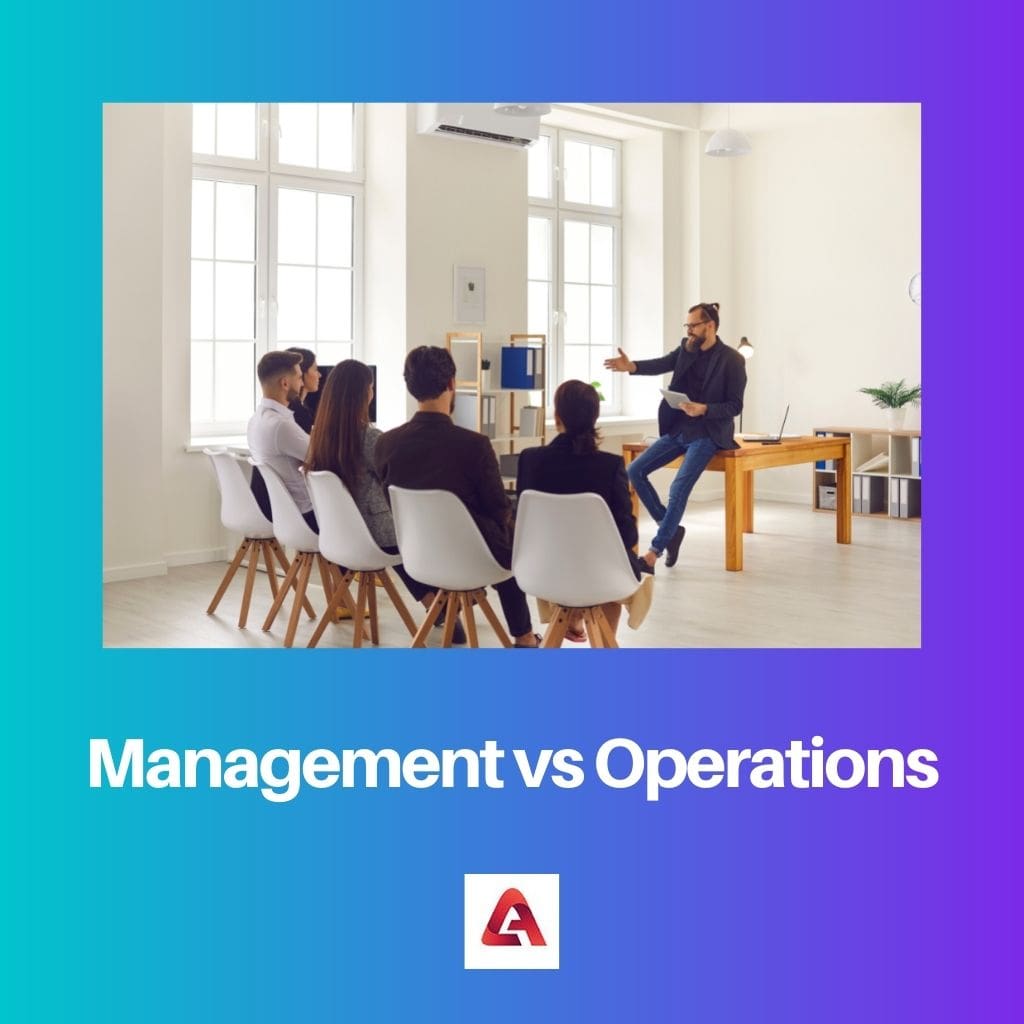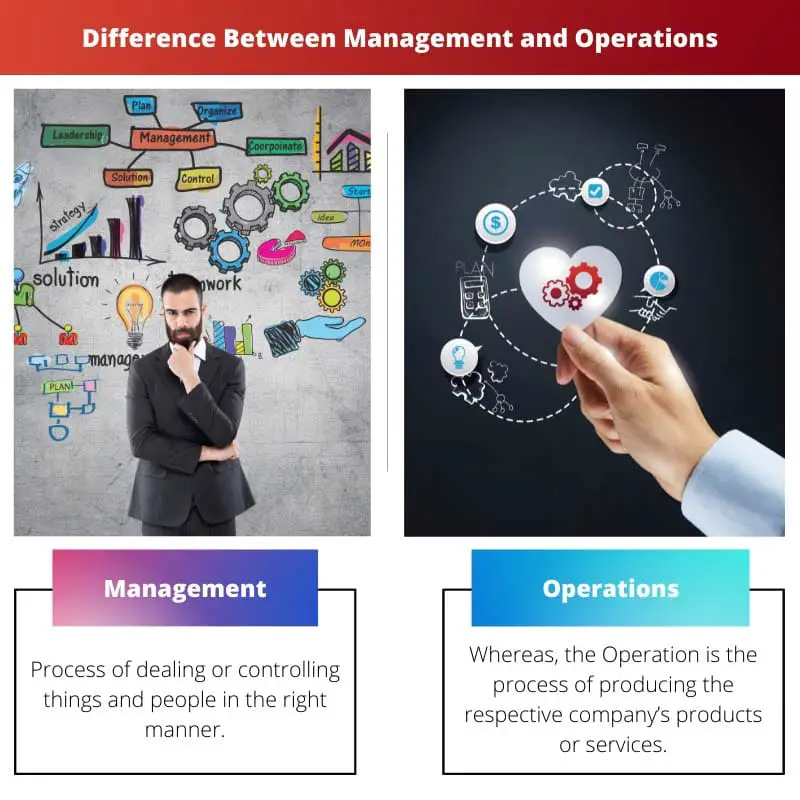Management involves planning, organizing, and coordinating resources to achieve organizational goals, focusing on strategic decision-making. Operations, on the other hand, deal with the day-to-day activities and processes necessary for the organization to function efficiently, emphasizing execution and tactical implementation.
Key Takeaways
- Management involves planning, organizing, directing, and controlling resources to achieve goals and objectives efficiently and effectively.
- Operations encompass the day-to-day activities and processes involved in producing goods or delivering services, focusing on efficiency, productivity, and quality.
- Management is responsible for overall strategic decision-making and resource allocation, while operations execute the plans and processes necessary for an organization’s functioning.
Management vs Operations
The difference between management and operations is in their meaning; the former is the administration of or the process of managing, whereas the latter is the method or schedule by which the production or manufacturing of goods and services occurs.

Comparison Table
| Feature | Management | Operations |
|---|---|---|
| Focus | Big picture, strategic planning, and overall direction | Day-to-day execution, efficiency, and productivity |
| Scope | Encompasses all aspects of the business | Focuses on specific processes and activities that produce goods or services |
| Time Horizon | Long-term (years) | Short-term (days, weeks, months) |
| Activities | Setting goals, developing strategies, allocating resources, making decisions, leadership | Production planning, scheduling, quality control, inventory management, logistics |
| Skills | Strategic thinking, problem-solving, communication, leadership, decision-making | Technical expertise, process improvement, data analysis, problem-solving, teamwork |
| Examples | CEO, CFO, COO, Department Heads | Production Supervisors, Quality Control Inspectors, Logistics Coordinators |
What is Management?
Hierarchy of Management Functions
- Planning: Planning is the foundational function of management, involving the formulation of goals, strategies, and action plans to guide the organization towards its objectives. It establishes a roadmap for decision-making and resource allocation.
- Organizing: Organizing involves arranging resources, such as human, financial, and physical assets, to facilitate the implementation of plans. This function establishes the organizational structure, defines roles and responsibilities, and ensures coordination among various elements.
- Leading (Directing): Leading, also known as directing, focuses on motivating and guiding individuals or teams to achieve organizational goals. Effective leadership involves communication, motivation, and conflict resolution, fostering a positive and productive work environment.
- Controlling: Controlling is the process of monitoring, evaluating, and adjusting activities to ensure they align with the organization’s plans. It involves setting performance standards, measuring actual performance, and implementing corrective actions when necessary.
Levels of Management
- Top-level Management: Top-level management consists of executives responsible for overall strategic planning and decision-making. They set the organization’s mission, vision, and goals, and ensure alignment with external factors.
- Middle-level Management: Middle-level management focuses on translating top-level strategies into actionable plans. It includes departmental managers and team leaders responsible for coordinating and implementing organizational policies.
- Front-line (First-line) Management: Front-line managers are directly involved in overseeing the day-to-day operations of teams and ensuring that tasks are completed according to established procedures. They play a crucial role in employee supervision and motivation.
Management Skills
- Technical Skills: Technical skills involve the ability to apply specialized knowledge and expertise in a specific field or industry. These skills are crucial for understanding and effectively managing organizational processes.
- Human Skills: Human skills involve the ability to interact, communicate, and work effectively with people. Managers with strong human skills can build and maintain positive relationships with employees and stakeholders.
- Conceptual Skills: Conceptual skills encompass the ability to think strategically, analyze complex situations, and make informed decisions. Managers with strong conceptual skills can understand the organization as a whole and anticipate future trends.
Contemporary Management Approaches
- Classical Approach: The classical approach emphasizes principles of efficiency, rationality, and formal organizational structures. It includes scientific management and bureaucratic management theories.
- Behavioral Approach: The behavioral approach focuses on understanding and improving human behavior within organizations. It emphasizes the social and psychological aspects of management.
- Systems Approach: The systems approach views organizations as interconnected and interdependent systems. It emphasizes the importance of considering the entire organization and its external environment.
- Contingency Approach: The contingency approach asserts that there is no one-size-fits-all solution to management problems. It suggests that the most effective management practices depend on the specific context and situation.

What are Operations?
Definition and Scope
Definition
Operations refer to the set of activities, processes, and systems employed by an organization to produce goods or services, meet customer needs, and achieve strategic objectives. It involves the coordination and execution of various tasks to ensure smooth functioning and optimal resource utilization.
Scope
The scope of operations extends across all functional areas within an organization, encompassing production, supply chain management, quality control, logistics, and more. It is not limited to manufacturing but is equally crucial in service-oriented industries.
Key Components of Operations
1. Production and Manufacturing
This component focuses on the actual creation of goods, involving processes like assembly lines, quality control, and efficient use of raw materials. Production management ensures timely delivery and cost-effective manufacturing.
2. Supply Chain Management
Supply chain management involves the coordination of activities from raw material procurement to the delivery of the final product. Efficient supply chain operations minimize costs and enhance responsiveness to market demands.
3. Quality Control
Maintaining high-quality standards is paramount. Quality control within operations ensures that products or services meet or exceed customer expectations. It involves inspections, testing, and continuous improvement processes.
4. Logistics
Logistics deals with the movement and storage of goods and services. Effective logistics operations optimize transportation, warehousing, and distribution networks to enhance overall efficiency.
5. Process Optimization
Continuous improvement and optimization of operational processes are crucial for staying competitive. Techniques like Six Sigma and Lean Management aim to eliminate waste and enhance productivity.
6. Inventory Management
Efficient inventory management ensures that the right quantity of goods is available at the right time. This involves balancing the costs associated with holding inventory against potential stockouts.
Importance of Operations
1. Cost Efficiency
Well-managed operations contribute to cost reduction through streamlined processes, efficient resource utilization, and minimized waste.
2. Customer Satisfaction
Operations directly impact product or service quality and delivery, influencing customer satisfaction and loyalty.
3. Competitive Advantage
Organizations with superior operations gain a competitive edge by offering high-quality products/services at competitive prices.
4. Adaptability
Effective operations management allows organizations to adapt to changing market conditions, technological advancements, and customer preferences.

Main Differences Between Management and Operations
- Scope:
- Management: Involves broader organizational responsibilities, including planning, organizing, coordinating, and controlling resources to achieve organizational goals.
- Operations: Focuses on the day-to-day activities and processes that directly contribute to the production of goods and services.
- Time Horizon:
- Management: Typically has a longer-term perspective, considering strategic goals and the overall direction of the organization.
- Operations: Emphasizes short-term goals and the efficient execution of routine tasks to meet immediate objectives.
- Decision-Making Level:
- Management: Involves top-level decision-making related to overall strategy, policy, and resource allocation.
- Operations: Involves middle and lower-level decision-making related to the execution of tasks, processes, and day-to-day activities.
- Focus on Change:
- Management: Often concerned with initiating and managing change within the organization to adapt to external factors or improve performance.
- Operations: Primarily concerned with maintaining and improving the efficiency of current processes and procedures.
- Nature of Work:
- Management: Involves more conceptual and planning activities, such as setting objectives, formulating policies, and strategic decision-making.
- Operations: Involves more hands-on, practical activities, such as production, quality control, and daily business operations.
- Measure of Success:
- Management: Success is measured in terms of overall organizational performance, achievement of strategic goals, and long-term sustainability.
- Operations: Success is measured in terms of efficiency, productivity, and the effective delivery of goods and services in the short term.
- Interpersonal Skills:
- Management: Requires strong leadership, communication, and strategic thinking skills to guide the organization towards its goals.
- Operations: Requires good coordination, problem-solving, and technical skills to ensure the smooth execution of daily tasks.
- Responsibility for Resources:
- Management: Manages and allocates resources at an organizational level, considering the needs of various departments and functions.
- Operations: Manages resources at a more granular level, focusing on optimizing resources within specific processes and activities.
- Risk Exposure:
- Management: Deals with higher-level risks related to market dynamics, competition, and overall business strategy.
- Operations: Deals with operational risks, such as production disruptions, supply chain issues, and quality control challenges.
- Innovation and Creativity:
- Management: Encourages innovation and creativity in developing new strategies, business models, and approaches.
- Operations: Focuses on optimizing existing processes, but may also involve incremental improvements and innovations within operational functions.





